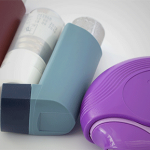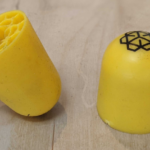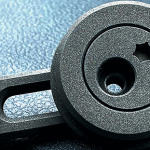- Home
- CNC Machining
- Does CNC machining mimic production parts?
Does CNC machining mimic production parts?
CNC machining: does it mimic production parts?
While CNC machining is commonly used for manufacturing production parts, both as one-offs and in high volumes, more often the reason customers come to us for CNC machining is for prototype parts.
In the early stages of a development project, CNC machined prototype parts might be required for proving a principle. At this point, therefore, a part is effectively a set of features with defined positions relative to each other. With such parts, mimicking production components is not necessary.
Later in the project, CNC machined parts will be representative of production parts. A plastic component might be CNC machined to mimic one that will, ultimately, be injection moulded, or a metal part might represent a die casting.
We are sometimes asked ‘How closely does CNC machining mimic production parts that will be injection moulded or die cast?’ The answer is not straightforward, so this article looks at some of the factors that can have an impact. For the most part the article relates to milled parts but many of the points are equally applicable to parts produced on CNC turning centres (lathes).
Draft angles
Injection moulded and die cast parts almost always require tooling with draft angles to enable the part to be ejected. With CNC machining this is not necessary and, in fact, it is easier (and quicker and cheaper) to machine a part with vertical sides. Of course, if the prototype part has been designed as a 3D solid model with draft, then our CAM software can import the model and generate toolpaths as required.
Often it makes no difference to a prototype whether or not there is draft. In some cases, however, whether for reasons of fit, function or appearance, it will be important to incorporate draft.
Material properties
When comparing a CNC machined prototype plastic part with an injection moulded production part, you have to bear in mind that plastic in a moulded part will have flowed in the mould tool, which partially orientates the polymer chains and can result in anisotropic properties. In contrast, parts machined from solid will have largely isotropic material properties or, if there is any anisotropy, it will be different from the anisotropy in a moulded part.
Also, the moulded part may contain weld lines (knit lines or meld lines) that have the potential to be weak points as well as detracting from the aesthetics. Prototyping with CNC machined parts can conceal this risk. However, with moulding analysis software, such issues should be predictable and the problem can be avoided or minimised.
Note that injection moulded and CNC machined parts are unlikely to be manufactured from the same grade of polymer, so the precise grade is likely to be different from one that would be specified for injection moulding, hence the material properties will not be identical.
For metal parts, the grade of alloy used for CNC machining will almost certainly not be the same as that used for die casting, so the material properties will be slightly different.
Warpage and distortion
Generally speaking, the material properties of solid plastics used for CNC machining are isotropic, hence the properties in the machined part will be isotropic. In fact, there could be some residual stresses in the solid material due to the production method (e.g., extrusion) and a degree of anisotropy. Because of this, we might check with the designer to ensure the machined part will perform optimally. We might also orientate a part to minimise the risk of any distortion caused by residual stresses in the material.
Some materials can be stress relieved by annealing prior and during machining but this adds time and cost. In most cases, we avoid warpage and distortion by selecting the optimum part orientation and taking care to ensure toolpaths will not contribute to distortion.
Warpage and distortion can occur in CNC machined metal parts but is less common and seldom a problem.
Setup
If two or more setups are required, we need to ensure the semi-machined part can be securely clamped. Depending on the part’s geometry, this may require one or more special fixtures to be made. These are normally CNC machined, which is why the job takes longer and costs more.
Pockets and slots
Consider an injection moulded plastic part with webs that support walls. For prototyping, a CNC machined part might be expected to include these webs. However, whereas a moulded part would have fillets between the wall and web with a relatively small radius to minimise sinkage opposite the web, this can be difficult to reproduce with a CNC machined part. The reason for this is that the fillet radius cannot be smaller than the radius on the cutting tool. A smaller radius requires a smaller cutting tool and there are limits to the diameter of a cutting tool for a given length (and depth of cut).
The issue of internal radii extends beyond web fillets to include any internal radii in pockets or other features.
Similarly, the maximum depth of a slot depends on the diameter of the cutting tool.
See our CNC machining page for more information about the relationship between cutting tool diameter and depth of cut.
Surface finishes
CNC machined parts have a characteristic pattern on the surface due to the motion of the cutting tool. If the part is for a proof-of-principle model or functional prototype, the as-machined finish is usually satisfactory. However, if aesthetics are important, the surface can be hand-polished or lightly bead blasted. There are numerous other finishing options as well, depending on the material and intended purpose of the part, so it is best to talk to us about your requirements.
We can normally match the surface finish of a CNC machined part to that of a production part but bear in mind that, for example, a painted finish on a CNC machined plastic part might not be as durable as a self-coloured injection moulded part.
Threaded holes and inserts
Our CNC machine tools benefit from automatic toolchangers, so threaded holes can be readily drilled and tapped in metals and plastics. If a plastic part has been designed to have other types of inserts, such as pins, studs and bushes, it might be possible to install the exact same type in the CNC machined part. If not, an alternative part with the same or similar performance can be specified. And, if that Is not an option, a special insert can be CNC machined as a separate component and fixed in position as necessary.
Undercuts
Injection moulded parts often incorporate undercuts for clips, snap-fits and other purposes. These add considerable cost to injection mould tooling so a designer might want to use CNC machined prototype parts to check the performance before committing to tooling. Fortunately, undercuts can be CNC machined though, as always, it depends on the geometry and whether a cutting tool can reach.
Conclusion
Taking all the above into account, what is the answer to the question ‘Does CNC machining mimic production parts?’ We can usually get extremely close and, even if the result is not 100 per cent perfect, it is almost always close enough to prove or disprove a design. As a result, the project team can move forwards with confidence.
Talk to us
If you would like to know more about CNC machining prototype parts, talk to us on 01763 249760.





